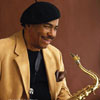In our ongoing series of dialogues with artists on their expectations of music critics & journalists, and the publications they write for, NEA Jazz Master Benny Golson – one of the more thoughtful people in this music – weighed in with two essays. Here is the second of Benny’s two erudite contributions to the dialogue.
The Value Of An Interview
In the early nineties, after being interviewed by a respected journalist of international repute, I was told by a mutual friend of ours that he was somewhat disappointed with my interview. Speaking of interviews in general, he said, “Some (people) have it and some don’t,” negatively referring to mine, of course. Without being influenced by “The law of unintended consequence,” I’ve found this to work both ways, however, if a person is not asked the most thought-provoking questions in a most thought-provoking way, the interview can become a challenge of linguistic arithmetic rather than that which is consequential and inspiring. The most meaningful way a interviewer can be consequential, that is, aside from knowing how to write, is to intimately know the subject — at least by reputation — prompting what he does, connoting as he probes on deeper levels. Connoting? That is, suggesting additional meaning, can prompt the subject to think in more expansive and intense ways, whether the suggestions of the interviewer are right or wrong. If he’s right, the subject, having first hand information, could possibly be inclined, influenced, persuaded to expound on it, taking it toward a logical and enlightening conclusion. If he’s wrong, the subject, again having first hand information, could possibly be prompted to defend the truth by elaborating on it. In both cases becoming much more exhaustive, circumstantial, and specific in his replies. Otherwise, the subject must be prepared to tirelessly fill in for what is adumbrate, fractional, equivocal, and opaque. Some interviewers often circle the camp but never enter. Things would be so much easier if they entered and directly touched someone or something. What I’m saying here is that a bad interview sometimes results because of the one chosen to conduct it. When an interview begins with: “When were you born?” or “Who is your favorite saxophone player?” or “When did you begin playing?” etc., rest assured, you’re off on an arduous journey to nowhere, believe me.
The unfortunate thing here is that the interviewer might never know what he’s done, or more accurately, what he’s not done. True, that which is basic is sometimes essential in setting up some sort of detailed backdrop, depending upon the nature of the interview. If it centers around times, places, and dates, then the questions will have no choice but to set up answers of chronological importance. In spite of this, never should the interview be platitudinous: banal, that is, deficient in originality, and freshness. Yes, freshness! No rubber stamp questions; each person interviewed is a completely different entity. Why try to fit him into someone else’s mold? Unfortunately, the interviewer might intuitively, or otherwise, be too strongly affected by the critical acclaim critically afforded himself, causing him to not always be critical of himself. It’s possible for him to be overreached by the complacency of self-assurance, even if he had no such intention. This, too, is a part of our imperfect, human make up. I mention this only because I’ve seen it happen time and again. The value of an interview depends upon all of the aforementioned things. But to what end? That people come away with not only information, but with things presented in an interesting, informative, and exhaustive way, enabling them to form a complete and accurate mental picture because of not being “there.” Afterall, that’s the purpose of an interview, isn’t it? These are all things that should be controlled by the interviewer, providing the subject understands. And if he doesn’t, it’s the interviewers commission to make him understand.
Fortunately, there are many wonderful journalists who bring out the best in the people they face; many even going beyond what I’ve written here. They are as gems meticulously cut from among humankind, then polished with the cloth of time.


Pingback: OPINION: Benny Golson on the Value of an Interview | Jazz Forum